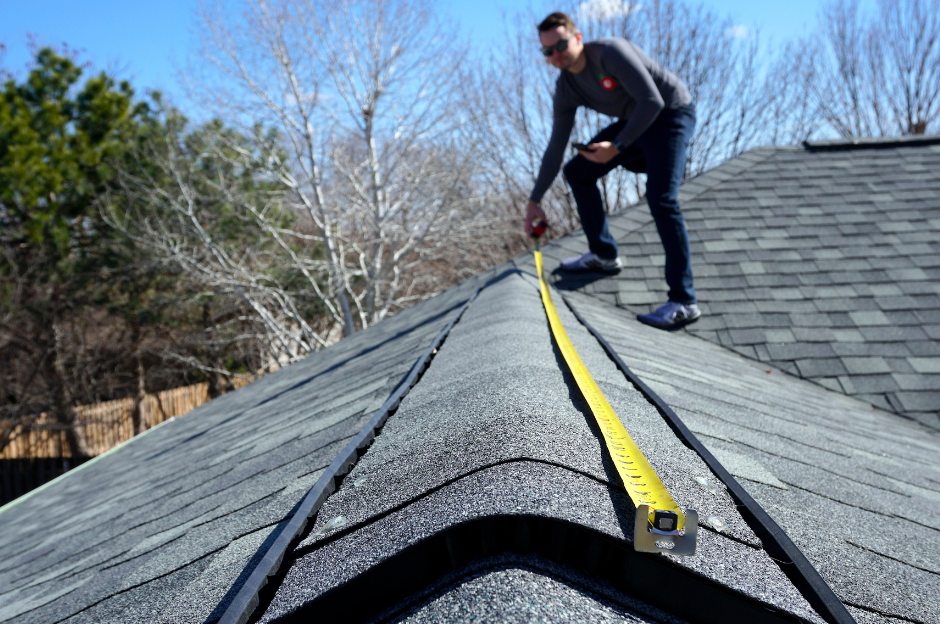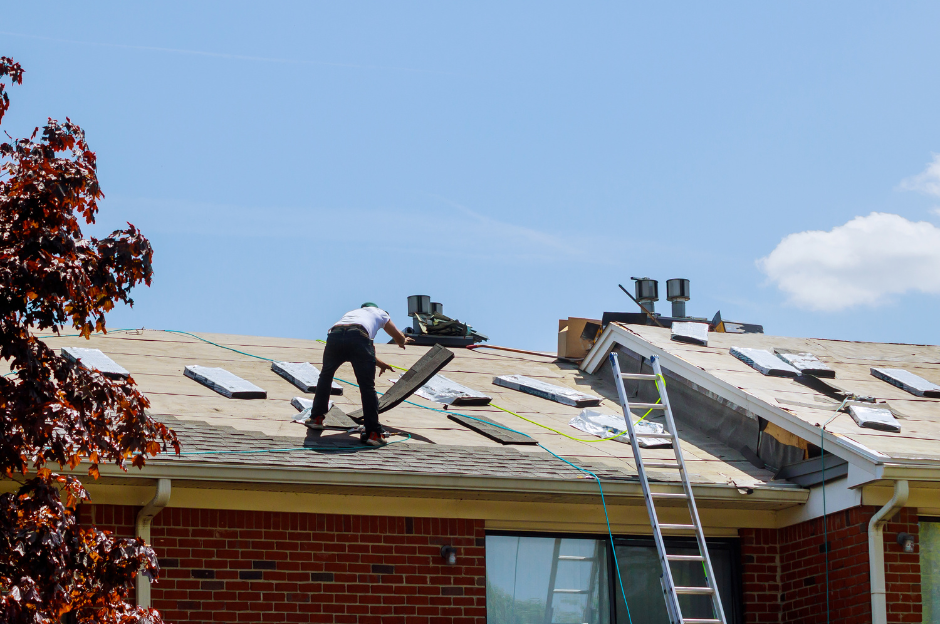The Ultimate Guide to Choosing the Right Roofing Solutions
March 23, 2024

Your roof is more than just a protective covering for your home; it's a critical component that safeguards your property and everything within it. When it comes to selecting the right roofing solutions, there are various factors to consider, including durability, weather resistance, energy efficiency, and aesthetics. In this comprehensive guide, we'll explore everything you need to know to choose the perfect roofing materials and solutions for your home or building.
Assess Your Needs and Budget:
Before diving into the multitude of roofing options available, it's essential to assess your needs and budget. Consider the following factors:
Roof Size and Shape: The size and shape of your roof will impact material requirements and installation costs. Complex roof designs may require specialized materials and labor, which can affect your budget.
Climate and Weather Conditions: Your local climate and weather patterns play a significant role in determining the most suitable roofing materials. Consider factors such as rainfall, snow loads, wind resistance, and temperature fluctuations.
Long-Term Goals: Are you planning to stay in your home for the long term, or do you anticipate selling in the near future? Your long-term goals can influence your roofing decisions, as some materials offer better durability and longevity than others.
Budget Constraints: Determine your budget for roofing materials and installation, taking into account both upfront costs and long-term maintenance expenses. While certain materials may have a higher initial cost, they may offer greater durability and lower maintenance requirements over time.
Explore Different Roofing Materials:
Once you've identified your needs and budget, it's time to explore the various roofing materials available. Here are some popular options to consider:
Asphalt Shingles: Asphalt shingles are the most common roofing material in North America, known for their affordability, versatility, and ease of installation. They come in a variety of colors and styles, making them suitable for a wide range of architectural designs.
Metal Roofing: Metal roofing offers exceptional durability, weather resistance, and energy efficiency. It's available in various materials, including steel, aluminum, copper, and zinc, each with its own unique benefits and aesthetic appeal.
Clay or Concrete Tiles: Clay and concrete tiles are renowned for their longevity, fire resistance, and architectural charm. They come in a range of profiles, colors, and textures, allowing for customization to suit your design preferences.
Wood Shingles or Shakes: Wood shingles and shakes provide a natural, rustic look that complements traditional and contemporary homes alike. While they require regular maintenance to prevent rot and decay, they offer excellent insulation and aesthetic appeal.
Slate Roofing: Slate roofing is prized for its timeless elegance, durability, and longevity. It's naturally resistant to fire, moisture, and pests, making it an ideal choice for homeowners seeking a high-end, low-maintenance roofing solution.
Synthetic Roofing Materials: Synthetic roofing materials, such as synthetic slate or composite shingles, offer the look and durability of natural materials with added benefits such as lightweight construction and ease of installation.
Consider Performance and Durability:
When selecting roofing materials, it's crucial to consider their performance and durability in your specific climate and environmental conditions. Here are some key factors to evaluate:
Weather Resistance: Choose roofing materials that are designed to withstand the elements prevalent in your area, whether it's heavy rainfall, high winds, extreme temperatures, or hailstorms.
Impact Resistance: Look for roofing materials with a high level of impact resistance, especially if you live in an area prone to severe weather or falling debris.
Fire Resistance: Opt for roofing materials that are rated for fire resistance, particularly if you reside in a wildfire-prone region or want to minimize the risk of fire damage to your property.
Longevity: Assess the expected lifespan of different roofing materials and choose options that offer the best combination of durability and longevity for your budget.
Warranty Coverage: Review the warranty coverage offered by manufacturers for their roofing materials, including warranties against defects, weather damage, and premature deterioration.
Evaluate Energy Efficiency and Sustainability:
In addition to performance and durability, consider the energy efficiency and sustainability of roofing materials. Here are some eco-friendly options to consider:
Cool Roofing: Cool roofing materials, such as reflective coatings or light-colored shingles, can help reduce heat absorption and lower energy consumption by reflecting sunlight away from the building.
Green Roofing: Green roofing systems, also known as living roofs or vegetative roofs, incorporate vegetation and planting beds to provide natural insulation, improve air quality, and reduce stormwater runoff.
Recycled and Sustainable Materials: Look for roofing materials made from recycled or sustainable materials, such as recycled metal, reclaimed wood, or eco-friendly composite materials.
Energy-Efficient Design: Consider roofing systems that integrate energy-efficient features, such as solar panels, skylights, or roof vents, to enhance indoor comfort and reduce reliance on artificial heating and cooling.
Hire a Qualified Roofing Contractor:
Once you've narrowed down your options and selected the right roofing materials for your needs, it's essential to hire a qualified roofing contractor to handle the installation process. Here are some tips for finding the right contractor:
Research Credentials: Look for roofing contractors who are licensed, bonded, and insured to perform roofing work in your area. Check their credentials, certifications, and industry affiliations to ensure they meet professional standards.
Experience and Expertise: Choose a roofing contractor with extensive experience and expertise in installing the type of roofing materials you've selected. Ask for references and examples of past projects to assess their quality of workmanship.
Obtain Multiple Quotes: Get quotes from several roofing contractors to compare pricing, scope of work, and warranty coverage. Avoid contractors who provide significantly lower estimates than their competitors, as they may cut corners or use inferior materials.
Review Contracts Carefully: Read the contract thoroughly before signing to ensure that all details, including materials, labor costs, payment terms, and project timelines, are clearly outlined and agreed upon.
Communication and Customer Service: Choose a roofing contractor who communicates effectively and provides excellent customer service throughout the project. They should be responsive to your questions, concerns, and feedback and keep you informed of any updates or changes to the project schedule.
Conclusion:
Choosing the right roofing solutions requires careful consideration of your needs, budget, climate, and aesthetic preferences. By assessing your requirements, exploring different roofing materials, and hiring a qualified contractor, you can ensure that your roof not only protects your property but also enhances its curb appeal, energy efficiency, and long-term value. Whether you opt for traditional asphalt shingles, durable metal roofing, or eco-friendly options such as cool or green roofing, investing in the right roofing solutions will provide peace of mind and security for years to come.
Henry Brothers Blog

Multi-family buildings pose unique challenges for roofing—requiring durable, efficient, and cost-effective solutions that serve multiple households simultaneously. Selecting the right system and partner can significantly impact long-term maintenance and energy bills. Common Roofing Challenges in Multi-Family Properties Large surface areas Multiple penetrations (vents, HVAC units) Noise and disruption during installation High foot traffic for maintenance Energy efficiency Efficient Roofing Materials TPO (Thermoplastic Polyolefin): Lightweight, reflective, and energy-efficient. Ideal for flat or low-slope roofs. Modified Bitumen: Offers durability and weather resistance. Works well for larger structures. Metal Roofing: Long-lasting and low-maintenance. Higher upfront costs but excellent ROI. Asphalt Shingles: Budget-friendly and easy to repair. Better for pitched multi-family homes. Affordability Strategies Bulk Purchasing Discounts: Roofers often offer lower rates for large-scale projects. Energy Rebates and Tax Credits: Cool roofing materials may qualify for incentives. Roof Coatings: Extend lifespan and defer full replacements. Preventive Maintenance Plans: Regular inspections reduce major repair costs. Partnering with the Right Contractor Choose a roofing contractor experienced in multi-family dwellings. Look for: References from similar projects Warranty offerings Insurance and licensing Clear timelines and communication protocols

Your roof is one of the most defining features of your home’s architecture. A well-designed roof complements the style, era, and character of your house, enhancing both curb appeal and value. Whether you own a modern home, a Victorian masterpiece, or a Mediterranean villa, choosing the right roofing materials and design is essential. This article explores custom roofing solutions for different architectural styles, ensuring your roof is both aesthetic and functional. 1. Why Custom Roofing Matters A one-size-fits-all approach doesn’t work for roofing. Here's why customization is key: 🏡 Preserves Architectural Integrity The roof should match the home's era and design. A poorly chosen roof can clash with the architecture and reduce property value. 💰 Boosts Home Value & Curb Appeal A well-matched roof enhances visual appeal, making your home stand out. Homebuyers prefer houses with roofs that fit the overall design. 🌦 Enhances Durability & Efficiency Custom roofing accounts for climate, slope, and insulation. Choosing the right materials ensures longer roof life and energy efficiency. 2. Best Roofing Materials for Different Architectural Styles 🏗 Modern & Contemporary Homes Modern architecture focuses on clean lines, minimalism, and energy efficiency. Best Roofing Options: ✅ Flat Roofs – Achieve a sleek, contemporary look. ✅ Metal Roofing – Durable and complements modern aesthetics. ✅ Green Roofs – Eco-friendly and visually striking. ✅ Solar Panels – Integrate renewable energy solutions. 🏰 Victorian & Gothic Revival Homes These homes have steep-pitched roofs, turrets, and elaborate detailing. Best Roofing Options: ✅ Slate Tiles – Classic, long-lasting, and historically accurate. ✅ Wood Shingles – Adds charm and natural beauty. ✅ Decorative Metal Accents – Enhances ornate Victorian designs. 🏝 Mediterranean & Spanish-Style Homes Inspired by European coastal homes, these feature stucco walls and curved archways. Best Roofing Options: ✅ Clay or Terracotta Tiles – Traditional, weather-resistant, and elegant. ✅ Concrete Tiles – Durable and available in various textures and colors. ✅ Synthetic Spanish Tiles – Modern, lightweight alternatives with classic appeal. 🌲 Rustic & Cabin-Style Homes These homes emphasize natural materials and a cozy aesthetic. Best Roofing Options: ✅ Wood Shakes – Blends seamlessly with wooded surroundings. ✅ Metal Roofing (Rustic Finish) – Durable with a weathered, natural look. ✅ Green Roofs – Enhances sustainability and insulation. 🏡 Colonial & Traditional Homes These timeless homes focus on symmetry and classic proportions. Best Roofing Options: ✅ Asphalt Shingles – Affordable and available in classic shades. ✅ Slate Roofing – Elegant and historically accurate. ✅ Copper or Metal Accents – Enhances historic charm. 🏛 Mid-Century Modern Homes This style features low-sloped roofs, large windows, and open spaces. Best Roofing Options: ✅ Flat or Low-Slope Roofs – Clean, minimalistic aesthetic. ✅ Rubber or Membrane Roofing – Ideal for low-pitch roofs. ✅ Green or Living Roofs – Complements eco-conscious designs. 🏰 Tudor-Style Homes Tudor homes have steeply pitched gables and decorative half-timbering. Best Roofing Options: ✅ Wood or Synthetic Shake Shingles – Traditional and authentic. ✅ Slate Roofing – Enhances historic charm and durability. ✅ Architectural Asphalt Shingles – Mimics wood or slate at a lower cost. 3. Custom Roofing Features to Consider Beyond materials, adding customized elements can elevate your roof’s design. 🔹 Roof Color & Texture Dark roofs enhance historic and formal homes. Light-colored roofs reflect heat, ideal for warm climates. Textured materials (slate, shakes) add visual depth. 🏠 Roof Shape & Pitch Steep roofs fit Gothic and Victorian styles. Flat or low-sloped roofs match modern homes. Custom pitches enhance energy efficiency and durability. 🔆 Skylights & Roof Windows Adds natural light and enhances ventilation. Works well in modern, contemporary, and rustic homes. 🌞 Solar Roofing & Smart Technology Solar shingles blend seamlessly into modern & eco-friendly homes. Smart roofing systems adjust ventilation & insulation automatically. 4. Custom Roofing: How to Get Started 1️⃣ Consult a Roofing Expert Work with an architect or contractor specializing in custom roofs. Ensure they understand historical accuracy and climate considerations. 2️⃣ Choose High-Quality Materials Invest in durability, energy efficiency, and aesthetics. Select roofing that aligns with your home’s style and longevity needs. 3️⃣ Consider Long-Term Costs & ROI Some materials have higher upfront costs but last longer and increase home value. Energy-efficient options can reduce heating and cooling expenses. 4️⃣ Verify Local Building Codes Some roofing styles require special permits. Ensure compliance with HOA guidelines and historical district regulations.


